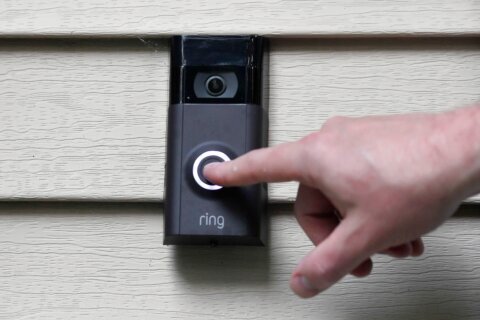This video is no longer available.
As part of Women’s History Month, WTOP explores how two sisters are taking a homegrown business to the next level with the help of a local incubator program that includes business mentoring and classes for the next generation of female entrepreneurs.
Turning a hobby into a successful business can be incredibly daunting. But when Maria and Sofia Tapias started their own sustainable jewelry business, the two sisters from Rockville, Maryland, hadn’t even considered all the challenges they would face.
“We started the business really on a whim,” Maria, the younger sister, told WTOP.
“We didn’t have time to think of all the reasons why we shouldn’t do it,” Sofia said.
“— or do a startup business plan,” Maria interjected.
They had both just graduated during the pandemic with undergraduate degrees in product design and psychology — which had almost nothing to do with jewelry-making or business management, but they both knew that they were “very passionate about fashion and sustainability.”
“I started making repurposed jewelry, but I needed brains in the whole operation. And she has those,” Sofia Tapias said, smiling at her younger sibling.
Despite their matching long, dark hair, glasses and big smiles, plus their penchant for finishing each other’s sentences, the Colombia-born sisters couldn’t be more different. Sofia is confidently chatty and charismatic, while Maria is more shy, quietly explaining the complexities of running a business and stepping in whenever Sofia forgets anything important.
Together, they’ve created Dov Jewelry and released collections of elegant earrings, rings and necklaces made from recycled metals. The sisters also ensure that their packaging and shipping are carbon neutral.
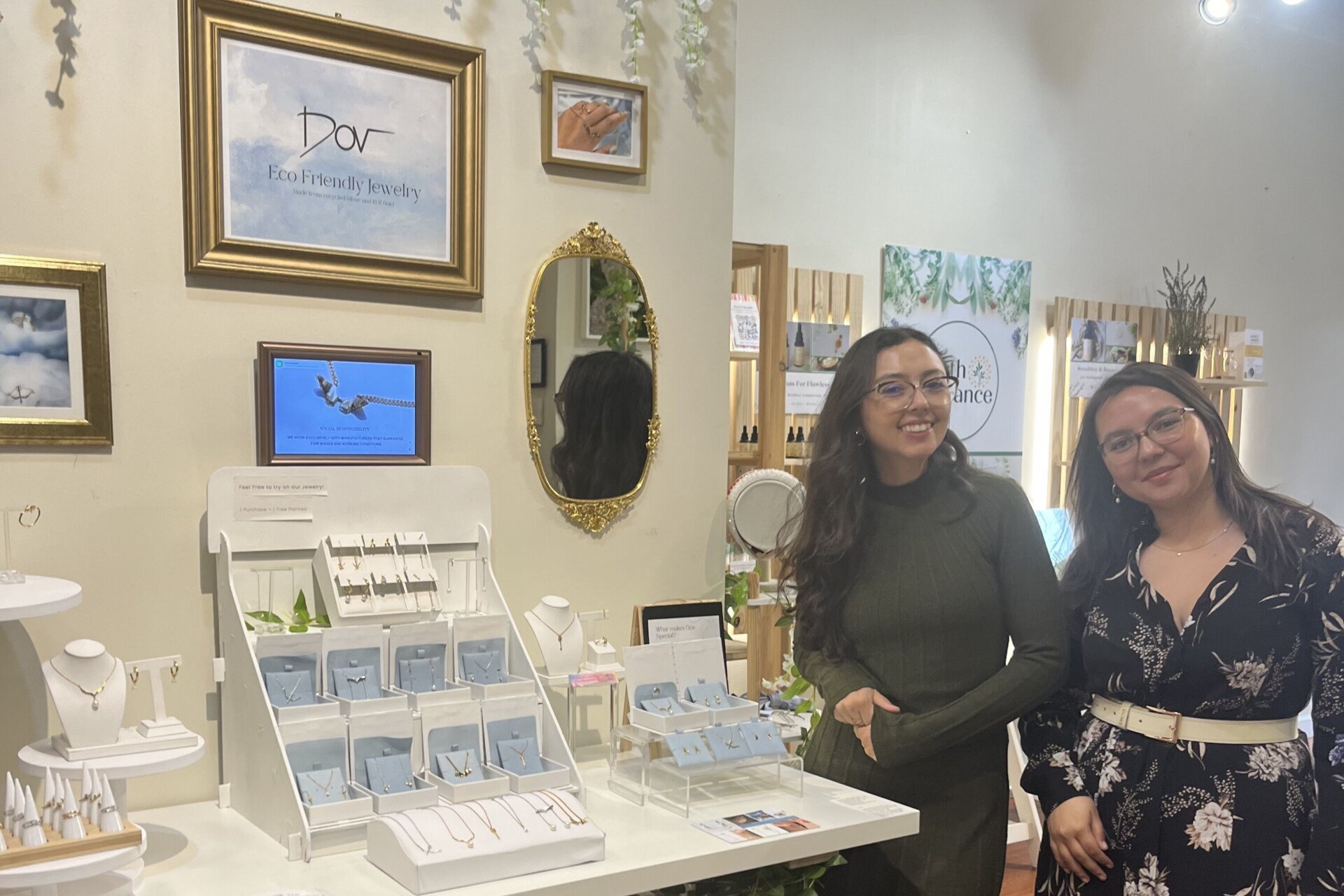
“Maybe we didn’t think about the business process, but everything else is incredibly intentional,” Sofia Tapias said. The sisters also donate a part of their profits to Fundación Nuevo Renacer, a nonprofit that supports impoverished children in Venezuela, which they say is part of giving back to their community in South America.
A helping hand with growing a business from scratch
The sisters had already set up an online store and brought their jewelry to art markets in D.C. when they started to consider expanding to their own in-person store.
“We were looking at doing a one month pop-up in D.C.,” Maria said. “The rent was looking like $10,000 for a month. And we were actually seriously considering it.”
Instead, they joined a yearlong incubator program exclusively for small women-owned businesses that has allowed them to experience running a shop for six months while paying less than $200 a month in rent.
The Maryland Women’s Business Center (MWBC), a nonprofit funded in part by federal and local government grants, sets up five to six business owners in a small, shared shop in downtown Rockville for six months. The program allows them to learn how to run a shop while receiving training on how to expand their businesses in other ways.
For historical context, women couldn’t apply for a business loan without a male relative as a co-signer until 1988. In 1972, there were a little over 400,000 women-owned businesses in the United States, according to the U.S. Small Business Administration.
Now, that number has grown to over 14 million women-owned businesses, according to the 2024 Wells Fargo Impact of Women-Owned Businesses Report. While that growth is exciting, women-owned businesses are still more likely to be rejected for a business loan than male-owned businesses, which impacts how large their businesses can grow and how long they last.
Danette Nguyen, managing director of MWBC, said the incubator program in Rockville is unique in its two-pronged approach: First, business owners manage and sell their wares in a rent-free space — they only split the utility bills. Second, they receive six months of mentoring that includes business-intensive classes.
“Almost 40 women have participated, and 74% are from underserved communities,” Nguyen said. Over 80% of the program’s graduates have also opened online or brick and mortar stores.
The emphasis on underserved communities is important. While the 2024 Wells Fargo report found Black women-owned and Latina women-owned businesses and revenues overall are growing at a faster rate than other women-owned businesses, businesses owned by Black and Latina women still struggle to secure business loans because they have the highest average credit risk.
Even with minority-owned businesses starting to recover after the pandemic, there is still a huge wealth gap for small businesses owned by Black and Latina women.
Unlike many other programs that just put their products on the shelves, small business owners in the incubator completely run the small shop together and take turns as the “general managers” of the store each month.
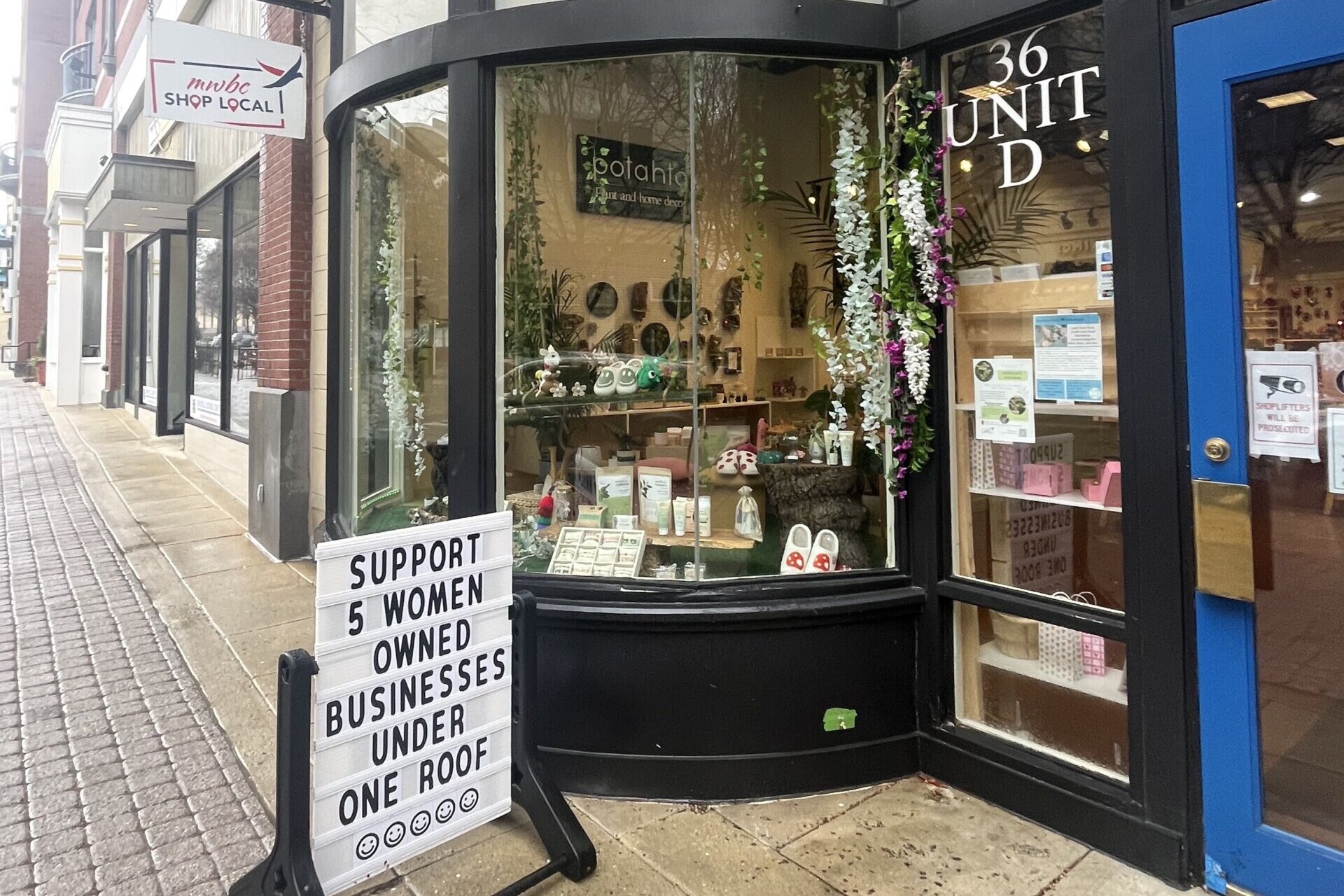
Looking back, the Tapias sisters say they were woefully unprepared to take on the expensive overhead costs and maintenance of their own store after having this experience.
“Understanding the steps of opening the store, cleaning the store, having everything ready, is incredible,” Sofia said. “The window display is huge, like setting up the window display is not something we would have ever thought about.”
Program participants attend networking events and make important connections, learning about local grants they can apply for to get their business off the ground.
“They are really trying to help us in any single way they can or connect us with people that can help you,” Maria said.
The other women-owned businesses currently sharing the shop space include Earth Radiance, an organic skin care line; Ramuri, a shop filled with bright Mexican artisan gifts; Potahto, a moss sculpture and house plant business; and DaisyyInTheGarden, a florist that specializes in arrangements for events and house plants.
Developing financial and personal confidence
Many of the women in the incubator agree that the program has helped them to develop a plan for expanding their business.
Daisy Abdullah Mason, the owner of DaisyyInTheGarden, watched her small business grow from posting her aloe vera plants on Instagram in 2020 to a full online floral shop that has already booked three weddings in 2024.
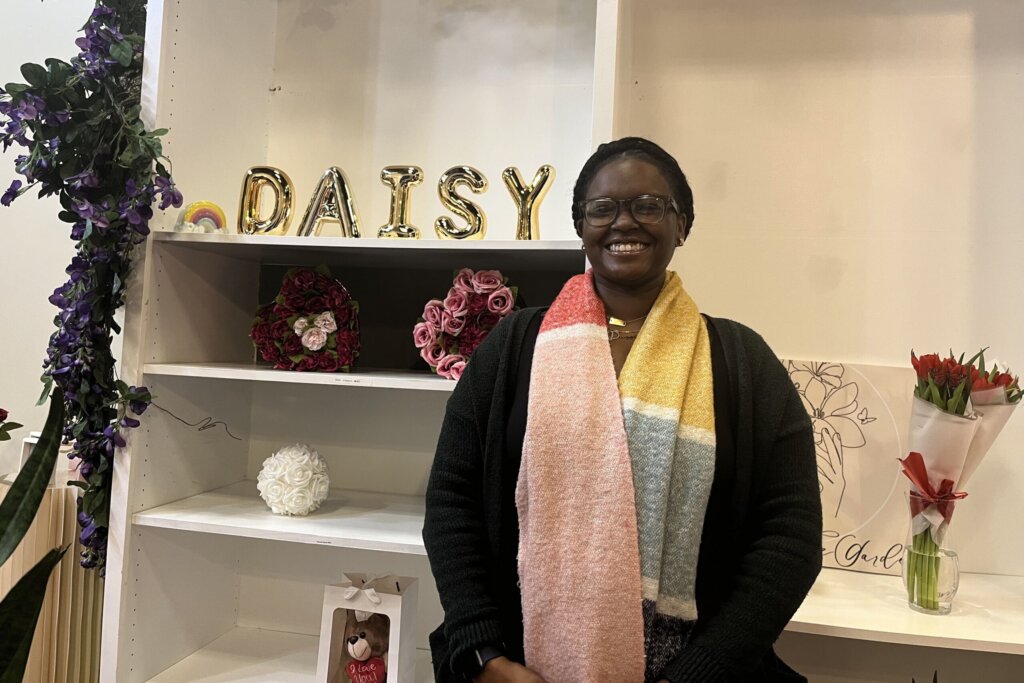
The incubator has empowered her to look beyond her small business as a hobby she loves and given her the confidence to “really start charging my worth,” she said.
Beyond confidence, Mason said MWBC has also helped her to develop financial discipline and long term plans for her business.
“We’re actually working on our business model now, which is a minimum of 10 pages,” she said. “So with the logistics, it’s helped a ton. I do hope to go into my own storefront. … I want this to be a staple, to be able to pass down to my children and generation on generation. So that’s the goal.”
Shweta Jain, the owner of Earth Radiance, said that she is most thankful for the “women empowerment” she has found in the program. Jain graduated from the Chesapeake School of Esthetics in 2017 and has a home studio in Edgewater, Maryland, where she takes skin care and wellness appointments.
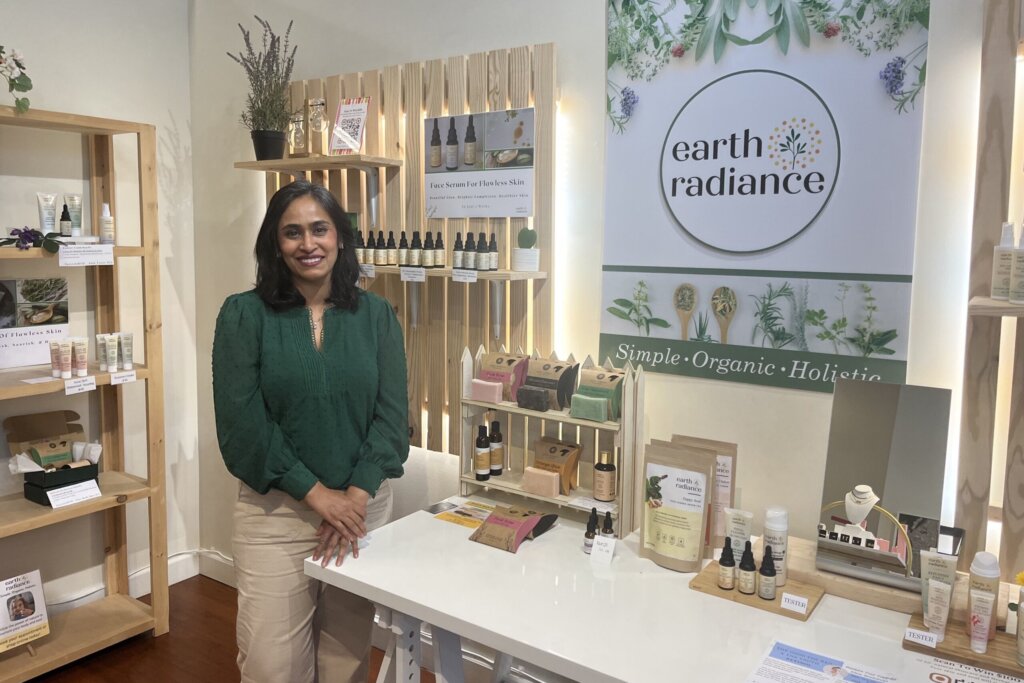
She developed her own skin care line in 2018 with a microbiologist in North Carolina because she was frustrated by “the availability of clean products” as an aesthetician for years.
After practicing her salesperson skills at the small shop, Jain said that MWBC is helping her figure out how to expand her business.
“Just talking about tax documents … to know that, yes, you have enough in your pocket that you can have your own brick and mortar,” she said. “I think those are my biggest hurdles today, how to take this to the next level.”
“You’re not alone”: Strength in diversity
The sisters behind Dov Jewelry said they feel incredibly lucky to be joining a small business community in the D.C. area, where Sofia Tapias finds that “everybody is so sweet and kind, and helpful” — instead of competitive.
“It is a sisterhood, I would say, that you create with these small businesses,” she said. “We are generally surrounded by women-owned businesses. And most of our friends are women-owned [business owners].”
That business community continues to grow in the D.C. metro area. A new report by Yelp found that D.C. ranks No. 3 for cities that saw growth in the number of women who opened businesses in 2023 compared to the previous year, with a 25% rise in women opening businesses.
Mason said being surrounded by these women and managing a store together in the incubator program has changed her perspective on building a diverse community.
“I feel like I’m so used to being in my own community and thinking about, selfishly, my own people,” she said. “I’ve learned women are women. People are people, and it’s like being in this store has really helped me learn a lot from different people, different cultures.”
Jain agreed that the support from women from various backgrounds has been “beautiful.”
“Especially being in a group network of other women’s businesses, it allows you to really see that it’s not you alone, struggling. You’re not alone,” Jain said.
Sofia Tapias has also been trying to spread the knowledge she’s gained from mentors in the incubator program to people from different cultures and nontraditional business backgrounds.
She’s taken on “private coaching with other small, women-owned businesses, especially if they don’t speak fluent English” in the Rockville area, helping them with their branding and marketing. One local woman gives Sofia homemade empanadas as payment for her coaching.
The “really close bonds” they’ve developed in the incubator have inspired the Tapias sisters to start looking for spaces they could rent out for a collective shop with some of the women from their cohort and other D.C.-area business owners once the program is over.
Maria Tapias said the group of women business owners have been getting quotes for different locations.
“We’re just trying to figure out the area,” she said. “But it’s something that we’re exploring. And that is super exciting.”
Get breaking news and daily headlines delivered to your email inbox by signing up here.
© 2024 WTOP. All Rights Reserved. This website is not intended for users located within the European Economic Area.


